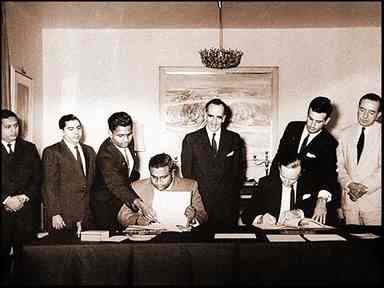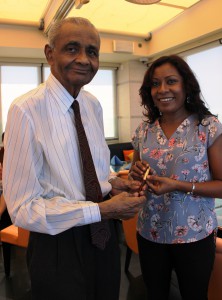26th July 2015 Colombo, Sri Lanka
Maldives at Fifty: penning a chapter in history

This year, we are celebrating fifty years of bilateral relations between the United Kingdom and the Republic of Maldives. That relationship started on 26 July 1965, with the signing of the Declaration of Independence.
That moment is captured in a famous photo, with Ibrahim Nasir Rannabandeyri Kilegefan, Prime Minister and Sir Micheal Walker, British Ambassador designate to the Maldive Islands, poised on the point of signature. Just behind Ibrahim Nasir Rannabandeyri Kilegefan stands a man with a golden pen. He is Mr Abdul Sattar Moosa Didi, the Maldives’ representative in Sr Lanka (then Ceylon), and later their Ambassador. Mr Sattar’s distinguished career in the Maldivian foreign service reached its apogee as Permanent Representative to the United Nations, before he moved into political roles, holding a number of Ministerial portfolios, including Education, Fisheries and Health. He is also one of the very few participants in that ceremony still living.

We spoke to Mr Sattar ahead of the Independence Day celebrations in Male’. Now in his seventies, he is bright and in good spirits – and still has the golden pen.
What is your most unforgettable memory of Independence Day?
For me, it was a sense of relief that all the hard work was over! In fact, the day passed very quickly, in a blur.
What was it like in the lead-up to the signing of the Declaration of Independence? What sort of preparation went into it?
The initial discussions started at the beginning of 1958. Negotiations took place in Colombo where I was based for seven years. The real discussions began in 1963. I was based in Colombo and every day after negotiations, which went clause-by-clause, I had to pass the details to the then President Ibrahim Nasir via Morse code as international direct dialling system did not exist then.
The final lead-up to the Declaration took up to three weeks and then, a sudden and secret decision was made to sign it.
How was the pen chosen – the one you held during the signing?
It belonged to President Nasir. He took it with him when he went to sign the Agreement and gave it to me when we returned home. I was using it for several years – it happened to be with me when HM The Queen wanted a fountain pen to sign the guest book when visiting Male’ in March 1972. I took it from my coat pocket and handed it to Her Majesty!
Earlier this month, a replica of the pen was made by an interested Maldivian citizen as part of the Maldives’ celebration of fifty years of independence. It was a very novel idea!
Fifty years down the road, what are your thoughts about the Maldives?
The Maldives has come a long way since then. Education in the English medium was adopted during the 1960s. Some of the most prominent positive developments that took place after the Declaration include the set up of a radio station and a TV station and recognition of a fishing fleet. Tourism started in 1972. In 1978, the first local community school opened. Reclamation of land for the new extension of Male’, named Hulhumale’, took place in recent years.
What is your wish for the future of the Maldives?
I wish to see a nation with lower crime rate and no drugs – a country of law-abiding citizens. We have enough laws. It’s the implementation and application of these laws that is the problem. Frankly, people still do not know what democracy is; for example, there is a limit to the freedom of speech. The reality is that everybody does not have to agree on everything, but doesn’t mean we should hate each other. In spite of differences, we should still learn to live together.
===
Everyone at the British High Commission to Sri Lanka and the Maldives would like to join Her Majesty The Queen in congratulating the people of the Maldives on this important anniversary, and wishing them well for the future.
Follow our #Maldives50Facts to read more about the breadth and depth of the UK-Maldives relationship.

I wish we never had independence, we would have been better off being ruled by the British. ?